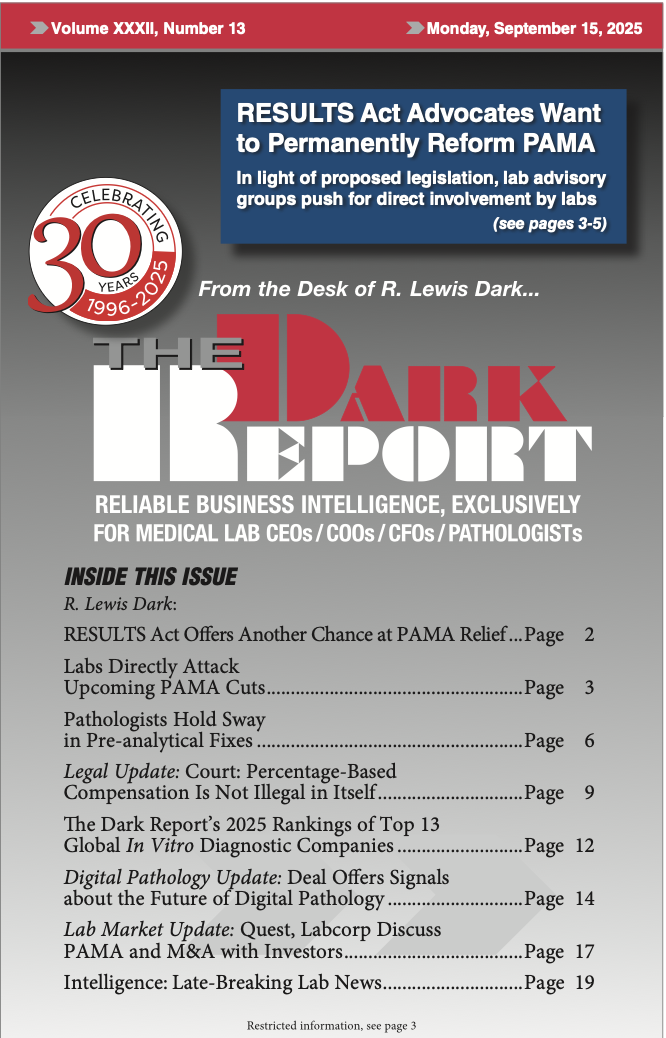Robert Michel
 Until Robert L. Michel came along and founded The Dark Intelligence Group (DIG) two decades ago, the clinical laboratory industry and the anatomic pathology profession lacked a trustworthy source for information about the management and operations of medical laboratories. From its inception in 1995, The Dark Report quickly became the “go to” source of industry intelligence, innovations in lab management, and strategic market analysis.
Until Robert L. Michel came along and founded The Dark Intelligence Group (DIG) two decades ago, the clinical laboratory industry and the anatomic pathology profession lacked a trustworthy source for information about the management and operations of medical laboratories. From its inception in 1995, The Dark Report quickly became the “go to” source of industry intelligence, innovations in lab management, and strategic market analysis.
This excellence in reporting has earned recognition from his peers. For example, twice Michel and The Dark Report have won national awards for best investigative reporting by the Specialty Information Publishers Association. In 2005, the award was for Michel’s coverage about how the anatomic pathology condominium laboratories (pod labs) operated by urologists and gastroenterologists came to be, who operated them, and how these owners marketed the AP condo labs to other physician groups. In 2009, Michel’s award for best investigative reporting resulted from his published interviews with Quest Diagnostics Incorporated when the company admitted that, for a period of 18 months, it had been reported inaccurate Vitamin 25(OH) D results because of problems with its laboratory-developed test methodology. The Dark Report’s story was picked up by The New York Times and was in the national news cycle for several days.
In his role as Editor-in-Chief, Michel brought unique capabilities to DIG and The Dark Report. His management training and diverse business experience—along with his skills as a concise writer and analyst—proved to be a winning combination for readers of The Dark Report. For that reason, Michel’s story has many intriguing elements.
Immediately prior to founding DIG, he had served in several executive positions for Nichols Institute based in Portland, Oregon, and San Juan Capistrano, California. This was during the time that Nichols Institute was an independent public lab company with annual revenues of about $280 million (prior to its acquisition by MetPath, Inc., now Quest Diagnostics Incorporated). He traveled extensively to many of the clinical lab business units owned by Nichols Institute in different regions of the United States and played a role in formulating effective market strategies in response to the emergence of closed-panel HMOs, capitated pricing, and full-risk managed care contracts, among other successful management initiatives.
Prior to his service at Nichols Institute, Michel served at three different Fortune 100 companies. These were Procter & Gamble, Centex Corporation, and Financial Corp. of America. Each was an opportunity to master new management techniques and apply them in different industries. Between these positions, he gained experience as an entrepreneur, having founded a real estate development firm and a general contracting company in the Southeastern United States.
Robert Michel earned a Bachelor of Arts degree in Economics at the University of California, Los Angeles, where he played rugby, a sport he participated in for another 22 years. He is a native of California and grew up in Santa Ana.
Articles by Robert Michel
Dynacare Inks New Pact With Milwaukee Hospital
From the Volume IV No. 11 – August 4, 1997 Issue
CEO SUMMARY: Dynacare is on the move again. Its latest partnership is with a leading Milwaukee hospital. Dynacare’s aggressive marketing effort to develop joint ventures with hospital laboratories will continue. It may announce more new contracts by year’s end. DEALMAKE…
“August 4, 1997 Intelligence: Late Breaking Lab News”
From the Volume IV No. 11 – August 4, 1997 Issue
Impressions from the AACC’s annual convention in Atlanta in July: With more than 16,000 attendees, it is much larger than CLMA. International attendees comprised at least 25% of that number. The exhibit hall is heavy on technical products and instruments. Conspicuously absent as exhibitors were the…
Legislators May Repeal New York Lab Surcharge
From the Volume IV No. 10 – July 14, 1997 Issue
CEO SUMMARY: On January 1, New York State began to tax lab tests performed by free-standing laboratories with an 8.18% surcharge. The New York State Clinical Laboratory Association took its message directly to the public. Laboratories in New York State created enough consumer protest that…
3 Blood Brothers Differ On Surcharge Strategies
From the Volume IV No. 10 – July 14, 1997 Issue
CEO SUMMARY: United we stand, divided we fall. On the issue of laboratory test surcharge repeal in New York, the three national labs took independent positions. Was the clinical industry served by this lack of unanimity? More importantly, do the actions of two of these national laboratori…
Proposed Monthly Test Limit Defeated By United Lab Action
From the Volume IV No. 10 – July 14, 1997 Issue
PROPOSALS TO CAP laboratory tests at no more than six per month for MediCal patients in California alarmed clinical laboratories throughout the state. The California Clinical Laboratory Association (CCLA) took immediate steps to counter the proposals. “This was a budget issue init…
Physician Management Companies Exploding, Will Transform Healthcare
From the Volume IV No. 10 – July 14, 1997 Issue
CEO SUMMARY: Consolidation and integration of healthcare services will be the dominant trend during the next five years. It happened to commercial laboratories from 1985-95. Widespread hospital consolidation began around 1990 and continues today. Now consolidation is coming to physicians….
Dismal Hospital Finances Behind Lab Joint Venture
From the Volume IV No. 10 – July 14, 1997 Issue
CEO SUMMARY: 1995 marked a pace-setting agreement between Columbia and LabCorp. LabCorp would consolidate and manage the laboratories at three Columbia Hospitals. All participants agree that the project has met expectations. But Columbia has yet to clone this model elsewhere. Here’s why…
“July 14, 1997 Intelligence: Late Breaking Lab News”
From the Volume IV No. 10 – July 14, 1997 Issue
Neuromedical Systems, Inc.’s (NSI) President and CEO, Mark Rutenberg, is probably the first victim of the Pap smear technology wars. It was announced on June 30 that Rutenberg had resigned. Apparently investors are unhappy with his company’s performance. Despite widespread promot…
Future Laboratory Model Found In Oklahoma City
From the Volume IV No. 9 – June 23, 1997 Issue
CEO SUMMARY: Even as commercial laboratories struggle to maintain financial solvency, Urocor displays phenomenal growth in specimen volume, market share and revenue during the last five years. It is no accident that this laboratory is succeeding. Urocor’s executives use sophisticated ma…
Management Philosophy Drives UroCor’s Success
From the Volume IV No. 9 – June 23, 1997 Issue
CEO SUMMARY: In the year 1997, UroCor shows a financial strength and growth potential unlike most commercial laboratories. UroCor’s current success is a direct result of how UroCor’s management did things differently during the years from 1991 to the present. Much of UroCor’s succes…
CURRENT ISSUE

Volume XXXII, No. 13 – September 15, 2025
The Dark Report examines a new bill that would reform PAMA and avoid reimbursement rate cuts scheduled for January 2026. Clinical laboratory leaders are urged to make their voices heard in Congress. Also, an expert describes how labs can fix pre-analytical errors and avoid disaster.
See the full table of contentsHow Much Laboratory Business Intelligence Have You Missed?
Lab leaders rely on THE DARK REPORT for actionable intelligence on important developments in the business of laboratory testing. Maximize the money you make-and the money you keep! Best of all, it is released every three weeks!
Sign up for TDR Insider
Join the Dark Intelligence Group FREE and get TDR Insider FREE!
Never miss a single update on the issues that matter to you and your business.
Topics
- Anatomic Pathology
- Clinical Chemistry
- Clinical Laboratory
- Clinical Laboratory Trends
- Digital Pathology
- Genetic Testing
- In Vitro Diagnostics
- IVD/Lab Informatics
- Lab Intelligence
- Lab Marketplace
- Lab Risk & Compliance
- Laboratory Automation
- Laboratory Billing
- Laboratory Compliance
- Laboratory Equipment
- Laboratory Information Systems
- Laboratory Management
- Lean Six Sigma
- Managed Care Contracts
- Molecular Diagnostics
- Pathology Trends
- People
- Uncategorized

